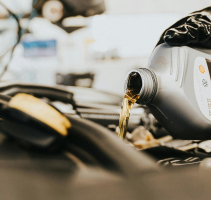
—
A new consolidated VW Tiguan engine oil consumption lawsuit has been filed after three class actions alleged Tiguan owners are forced to constantly add oil to prevent engine damage.
According to the class action, the EA888 2.0-liter TSI engine was built by Volkswagen and holds five quarts of oil that should be changed every 10,000 miles or every year, whichever occurs first.
According to Volkswagen, the Tiguan oil consumption standard is, “up to 0.5 quarts per 600 miles, or 0.5 liters per 1000 km.”
Every 2022-2023 VW Tiguan is equipped with a smart oil monitor that gauges how much oil is in the engine and illuminates a light when the SUV needs oil added.
The automaker allegedly failed to tell Tiguan customers about the abnormal excessive oil consumption and how they would need to add oil at shorter intervals than VW’s recommendations. Tiguan owners also were not warned about the additional expense of driving a vehicle that often needs more oil.
And according to the lawsuit, excessive oil consumption can cause the Tiguan engine to stall and fail while driving, increasing the risk of a crash. This is something Volkswagen allegedly knew long ago but failed to repair. The plaintiffs complain Volkswagen has continued to refuse oil consumption repairs for free.
Additionally, the plaintiffs argue VW goes so far as to deny there are oil consumption problems, and dealers often tell Tiguan owners the SUVs are running properly. The plaintiffs further claim all Tiguan owners wouldn’t have purchased their SUVs or they would have paid a lot less for them if Volkswagen would have warned them about oil consumption problems.
The VW Tiguan oil consumption class action says the defects are found in the pistons and piston rings. The tension ring tension allegedly isn’t strong enough which allows engine oil to enter the combustion chamber.
According to the Tiguan class action:
“If engine oil is able to pass between any of these piston rings and the surface of the cylinder wall, then the engine oil will enter the combustion chamber of the engine. Once engine oil is in the combustion chamber, it will not only cause a decrease in engine performance, but the engine oil will also be burned off during the Combustion Cycle sequence thereby reducing the overall amount of oil contained in the engine.”
The plaintiffs also complain oil in the combustion chamber will cause carbon deposits to form within the Tiguan engine which causes damage to the ignition and emission components.
The seven Tiguan owners who sued also complain the positive crankcase ventilation (PCV) system is defective because it allegedly fails to reduce pressure inside the crankcase “caused by combustion gases escaping from the combustion chamber, past the piston and oil rings, and into the crankcase.”
“This is because the increased blow-by as a result of the reduced piston and oil control ring tensions in an effort to decrease overall friction within the engine in the hopes of gaining greater MPG. As a result, this has a direct negative impact on the vehicles durability, life expectancy, performance and emissions.” — Volkswagen EA888 engine lawsuit
The VW Tiguan engine oil consumption class action lawsuit was filed by these customers:
- Stacy Zeiders / North Carolina / 2022 Volkswagen Tiguan
- Calvin Westlund / Maryland / 2022 Volkswagen Tiguan
- Maria Lydia Martinez / Georgia / 2023 Volkswagen Tiguan
- Jae Young Choi / New Jersey / 2022 Volkswagen Tiguan
- Amanda DeLong / Illinois / 2022 Volkswagen Tiguan
- Brian Cramer / Delaware / 2022 Volkswagen Tiguan
- Scott Worthington / Minnesota / 2022 Volkswagen Tiguan
The Volkswagen Tiguan engine oil consumption class action lawsuit was filed in the U.S. District Court for the District of New Jersey (Newark Vicinage): Zeiders, et al., v. Volkswagen Group of America, Inc., case number 2:24-cv-11197-BRM-JSA.
The plaintiffs are represented by Shub Johns & Holbrook LLP, Sauder Schelkopf, and Lemberg Law, LLC.

